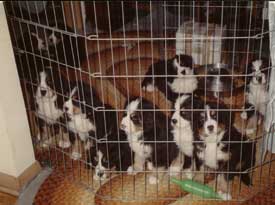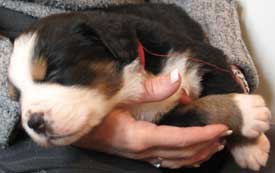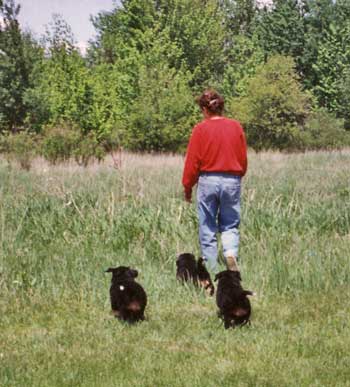 Are you thinking about breeding your Berner?
Are you thinking about breeding your Berner?
**Considerations**
Spayed or neutered dogs are not likely to develop health problems known to be associated with reproductive organs (Mammary tumors / pyometra *search articles / prostate diseases). The 2005 BMDCA Health survey indicates spayed/neutered pets live longer than intact Berners. The Health Survey also contains other important data related to dogs and bitches used for breeding.
If you are planning to breed your Bernese Mountain Dog, we understand that you have the best intentions & we'd like to help you think through your decision.
Puppy buyers are thrilled when they own a healthy, happy Berner. As a breeder you will get great satisfaction from being a part of their joy. First things first. Berner breeders are well served to take seriously their responsibility to ensure the dogs used for breeding are in excellent health and have the potential to produce sound healthy pups. Of course you believe your Berner dog or bitch is a terrific dog, and he/she is. A beloved pet can have many fine attributes in its owner's eyes, but the dog may not be a good producer for any number of reasons (health, temperament, family history). Talk with your dog's breeder about the health and reproductive history in their families of dogs - don't proceed without facts and assume everything will be fine. Talk with other seasoned Berner breeders too; discussing their experiences breeding Bernese might provide helpful insights.
Some things to think about are: every time you breed your bitch you put her life at risk. It is not unheard of for Berner bitches to die, even in experienced breeder's and veterinarian's care during or post whelp. Losing a companion dog under these conditions is devastating. Bernese Mountain Dogs often times are not 'easy breeders'. While some Berner bitches breed naturally and free whelp litters of puppies, owners have encountered difficulty with getting bitches to stand for breeding, and faced problems with their bitches' successfully bringing healthy litters to full term. Bitches miss (are bred and don't get pregnant), resorb pups, give birth to pups with serious birth defects. Pregnancy and delivery aren't always simple. C - sections, emergency or planned, are all too often necessary to save lives of dam and pups. Many Berner owners work with veterinarians who are reproductive specialists since their expertise is helpful to address canine reproductive issues. Be prepared! Breeding Berners can get very expensive quickly when you start to add up cost of stud fees and costs involved in getting bitches bred, and raising litters.
Ask yourself if you
► have enough knowledge of dogs, the breed and the family of dogs from which your puppy comes to evaluate the actual qualities of breeding stock.
► want to get involved in the time and expenses for genetic testing of dogs to be bred prior to breeding to verify their health status (hips, elbows, eyes other inherited diseases).
► know how to plan and make arrangements for a breeding to occur with your dog.
► can afford vet care and other expenses for a dam and her pups [pre breeding vaginal cultures, brucellosis tests, c-section (cost - Est. $400.00 - $3000.00), complications or illness, vaccines for pups, dew claw removal, extra food, extra phone charges, whelping equipment, exercise pens for puppies, travel expenses...]
► want to manage a stud dog, which may involve providing secure housing and exercise for 'in season' bitches, managing the mating(s), evaluating breeding suitability of bitches including their pedigrees, assessing bitch owners' focus, facilities and commitment to pups, arranging for sperm checks, artificial insemination and additional vet fees. Can you imagine dogs 'possessed' by their instinct to mate, jumping fences, not interested in obeying your commands, crashing through doors, fighting with other pets over territorial disputes, howling all night long when you have to go to work the next day? It happens!
 Should you decide to breed your Bernese, be aware that as a breeder
Should you decide to breed your Bernese, be aware that as a breeder
► you must have a living situation (inside and outside the home) that is appropriate for raising a litter and the time to adequately socialize and place puppies.
► placement of puppies with responsible owners takes time on the phone and involves prospective owners visiting your home.
► you will need to evaluate prospective owners for their capability and willingness to provide a nurturing lifetime home for a pup.
► you will have to evaluate every puppy in a litter for the suitability of its individual character and physical traits to meet the expectations of potential owners.
► you'll need to think about what you would do if a puppy placement didn't work and the pup you bred was placed in rescue.
► you need to think about whether it is important to you to to help owners of your puppies resolve health or training problems and if you have enough time, knowledge & expertise to do so.
► owners of your pups may decide to return a boisterous untrained 4 year old dog to you, a pup that developed crippling hip or elbow dysplasia or a senior in failing health.
Breeding Bernese is not something that should be done on a whim. Should you want to breed your Berner, do so conscientiously and with compassion for the lives you have created.
Take under advisement - the families with whom you place puppies are expecting to be provided with a pup that is healthy and sound in body and temperament.
► Some people who purchase pups may become difficult to deal with (won't listen to your advice, don't share your focus or appreciate your ideas or fail to comply with contractual obligations).
► Do you want to become involved with a puppy buyer who has the inclination & financial means to initiate a lawsuit against you if the pup isn't measuring up to their expectations?
► Do you know about Puppy Lemon Laws and how can they affect you and your puppies?
► Please realize your puppy buyer's living situations can change over time which can affect their ability to provide care for a pup or adult dog. Divorce from spouse, new human babies, job changes, family illness, financial problems, moving, other pets can significantly alter any Berner owners' situation which impacts their relationship with their Berner.
For more information on becoming a responsible breeder see Breeder Approach & Focus
Breeder tools and articles

- Berner Illustrated
- Pedigree/writable
- Puppy Record/writable
- Bernese Pedigree Research and Analysis
- Pine Trees, Pails, and Parts (Sylvia Howison)
- Fred Lanting - Inbreeding, Diversity, Genetics (external link)
- Fred Lanting - Inbreeding, Diversity, Genetics - Part 2 (external link)
- Fred Lanting - Inbreeding, Diversity, Genetics - Part 3 (external link)
- Volhard Puppy Aptitude Test (PAT) (external link)
Books for breeders at amazon.com
Genetics of the Dog by Malcolm B. Willis
Practical Genetics for Dog Breeders by Malcolm B. Willis
Control of Canine Genetic Diseases (Padgett D.V.M.)
Canine Reproduction: The Breeder's Guide by Phyllis A. Holst
Canine and Feline Endocrinology and Reproduction by Edward C. Feldman and Richard W. Nelson
Dog Locomotion and Gait Analysis by Curtis M. Brown
K-9 Structure & Terminology by Edward M. Gilbert Jr. & Thelma R. Brown
Dogsteps: A New Look by Rachel Elliott
Books or cd's/dvd's at workingdogs.com
Your Athletic Dog Video & Workbook by Suzanne Clothier
The Dog in Action by McDowell Lyon
Canine Cineradiography DVD by Rachel Page Elliott